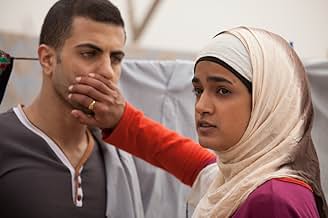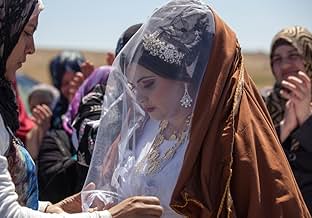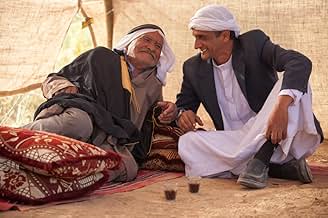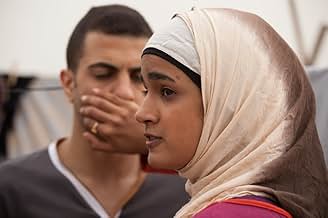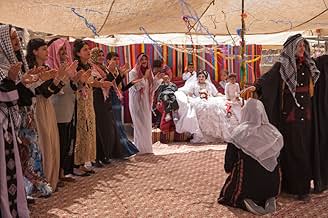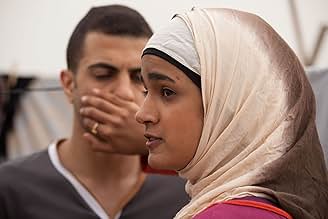Agrega una trama en tu idiomaWhen their entire lives shatter, two Bedouin women struggle to change the unchangeable rules, each in her own individual way.When their entire lives shatter, two Bedouin women struggle to change the unchangeable rules, each in her own individual way.When their entire lives shatter, two Bedouin women struggle to change the unchangeable rules, each in her own individual way.
- Dirección
- Guionista
- Elenco
- Premios
- 15 premios ganados y 19 nominaciones en total
Hitham Omari
- Suliman
- (as Haitham Omari)
Khadija Al Akel
- Tasnim
- (as Khadija Alakel)
- Dirección
- Guionista
- Todo el elenco y el equipo
- Producción, taquilla y más en IMDbPro
Opiniones destacadas
This film depicts a Bedouin family on the brink of changing traditions.
When the father of the family takes a second wife, and the daughter finds herself in love with a boy from college. Each character must make decisions that will change the outcome of the family. Although a main theme is about woman living in world of strict traditions I think it is mainly about a family trying to make the right decisions for each other.
Throughout the film the director will turn you against the adults, and then give you a window of insight that will allow you to sympathize with them. I was constantly urging the characters to do something, on the end of the seat, and although the film left me a little sad you must look beyond the film, to what it is trying to hint the future may hold, not just for the protagonists, but all woman around the world.
I will certainly be thinking about Layla, her sister and what life has in hold for them, for a while.
When the father of the family takes a second wife, and the daughter finds herself in love with a boy from college. Each character must make decisions that will change the outcome of the family. Although a main theme is about woman living in world of strict traditions I think it is mainly about a family trying to make the right decisions for each other.
Throughout the film the director will turn you against the adults, and then give you a window of insight that will allow you to sympathize with them. I was constantly urging the characters to do something, on the end of the seat, and although the film left me a little sad you must look beyond the film, to what it is trying to hint the future may hold, not just for the protagonists, but all woman around the world.
I will certainly be thinking about Layla, her sister and what life has in hold for them, for a while.
Perhaps I have to reevaluate my ingrained trust with 7 stars rating as a metric of quality, with this at 6.8 I didn't expect so high. I anticipated it to be a stereotypical, politically charged Arab's crude conservatism imagery that detach, delineate you to side clearly off the black and white character (as in social value metric not typical good and bad). Unexpectedly, it unpacks humanely with a blend of conflicting contradiction in the character far from being one dimensional, inhibited by consequence we have no clear insight about but hinted. Someone or thing is either way at stake. The father fosters a certain privilege to his daughter but hypocrite through indirect treatment to his first wife, yet you still pity him for whatever it is that inhibit him. Her mom, uptight and resentful turns out protecting her for an option her daughter deserves, more so than the more liberal father.
Halfway through I found it well put and anticipated a disappointing turn that justifies the below 7 rating. There was none. The ending is not as justly suited to what her strong personality suggested to be, by (spoiler) having her bent to tradition eventually (but well, this is real life). She remained guarded unmannerly at the end. The new husband's hint of submissive reaction draws him less of a typical antagonist. Made you think that fairness aside, it has yet been proven to be dramatically a whole lot of wrong turn, just like real life: some options might be not entirely bad but not wanting it in the first place compromised some degree of unsatisfactory or happiness.
Halfway through I found it well put and anticipated a disappointing turn that justifies the below 7 rating. There was none. The ending is not as justly suited to what her strong personality suggested to be, by (spoiler) having her bent to tradition eventually (but well, this is real life). She remained guarded unmannerly at the end. The new husband's hint of submissive reaction draws him less of a typical antagonist. Made you think that fairness aside, it has yet been proven to be dramatically a whole lot of wrong turn, just like real life: some options might be not entirely bad but not wanting it in the first place compromised some degree of unsatisfactory or happiness.
The film follows the struggle of a young Bedouin girl and her will to be free of old traditions that try to keep her caged in a man's world. The main plot follows Jalila (Ruba Blal-Asfour), the first wife of a man that is trapped under the pressure of having a new young wife join the clan. Her daughter, Layla (Lamis Ammar), has a secret lover at school, and Jalila must decide if she is part of the mechanism that will trap her daughter too or going to fight for the next generation to have more than she could ever dream of. The brave directing and storytelling brings to the screen a complex story, exhibiting female struggles from a very specific perspective yet in a very universal way. It is not by chance that the film has had such a successful festival circuit.
Sufat Chol (2016) is an Israeli movie that was shown in the U.S. with the title Sand Storm. It was written and directed by Elite Zexer.
The film takes place in an area of Israel where the Bedouins live. (Truth in reviewing--I didn't know there were Bedouins in Israel. However, they make up 3.5% of the population.) The film is in Arabic, and no Jewish Israelis appear in it. There is one mention of houses being bulldozed, but that's the only sense that there's a majority population outside the village.
Lamis Ammar plays Layla, a intelligent young woman, who is in love with "someone from a different tribe." That's not OK.
Ruba Blal portrays Jalila, Layla's mother. Hitham Omari is Suliman, Layla's father and Jalila's husband.
Matters are a little confusing in the beginning, as a pickup truck arrives at a home. The load in the pickup truck is a new bed. It signals to us that Suliman has taken a second wife. The bed is their wedding bed.
We know that, for Muslims, having more than one wife is normative. However, as the plot develops, it's clear that other matters that are considered normative appear unacceptable by our standards.
In fact, the rules and restrictions of the village appeared medieval to me. I considered whether this was an Israeli propaganda film, showing to the world how primitive the Bedouins are. However, a close friend, who is knowledgeable about these matters, assured me that this is the reality of Bedouin life in Israel.
The restrictions the mother and daughter face are disturbing and grim. However, that's what makes up the plot of the film.
This movie worked well on the small screen. It has an anemic IMDb rating of 6.8. I wondered why this important movie had such a low rating. When I checked the demographics it became clearer. Men rated it 6.7, while females rated it 7.0. (As usual, male raters outnumbered female raters. In this case, it was two to one.)
I think even 7.0 is too low for this movie. I rated it 9.
The film takes place in an area of Israel where the Bedouins live. (Truth in reviewing--I didn't know there were Bedouins in Israel. However, they make up 3.5% of the population.) The film is in Arabic, and no Jewish Israelis appear in it. There is one mention of houses being bulldozed, but that's the only sense that there's a majority population outside the village.
Lamis Ammar plays Layla, a intelligent young woman, who is in love with "someone from a different tribe." That's not OK.
Ruba Blal portrays Jalila, Layla's mother. Hitham Omari is Suliman, Layla's father and Jalila's husband.
Matters are a little confusing in the beginning, as a pickup truck arrives at a home. The load in the pickup truck is a new bed. It signals to us that Suliman has taken a second wife. The bed is their wedding bed.
We know that, for Muslims, having more than one wife is normative. However, as the plot develops, it's clear that other matters that are considered normative appear unacceptable by our standards.
In fact, the rules and restrictions of the village appeared medieval to me. I considered whether this was an Israeli propaganda film, showing to the world how primitive the Bedouins are. However, a close friend, who is knowledgeable about these matters, assured me that this is the reality of Bedouin life in Israel.
The restrictions the mother and daughter face are disturbing and grim. However, that's what makes up the plot of the film.
This movie worked well on the small screen. It has an anemic IMDb rating of 6.8. I wondered why this important movie had such a low rating. When I checked the demographics it became clearer. Men rated it 6.7, while females rated it 7.0. (As usual, male raters outnumbered female raters. In this case, it was two to one.)
I think even 7.0 is too low for this movie. I rated it 9.
¿Sabías que…?
- TriviaFirst full-length feature for the director Elite Zexer.
Selecciones populares
Inicia sesión para calificar y agrega a la lista de videos para obtener recomendaciones personalizadas
- How long is Sand Storm?Con tecnología de Alexa
Detalles
- Fecha de lanzamiento
- Países de origen
- Sitio oficial
- Idioma
- También se conoce como
- Kum Firtinasi
- Locaciones de filmación
- Productoras
- Ver más créditos de la compañía en IMDbPro
Taquilla
- Presupuesto
- ILS 3,850,000 (estimado)
- Total en EE. UU. y Canadá
- USD 86,800
- Fin de semana de estreno en EE. UU. y Canadá
- USD 6,849
- 2 oct 2016
- Total a nivel mundial
- USD 414,698
- Tiempo de ejecución1 hora 27 minutos
- Color
- Mezcla de sonido
- Relación de aspecto
- 2.35 : 1
Contribuir a esta página
Sugiere una edición o agrega el contenido que falta

Principales brechas de datos
By what name was Sand Storm (2016) officially released in India in English?
Responda

